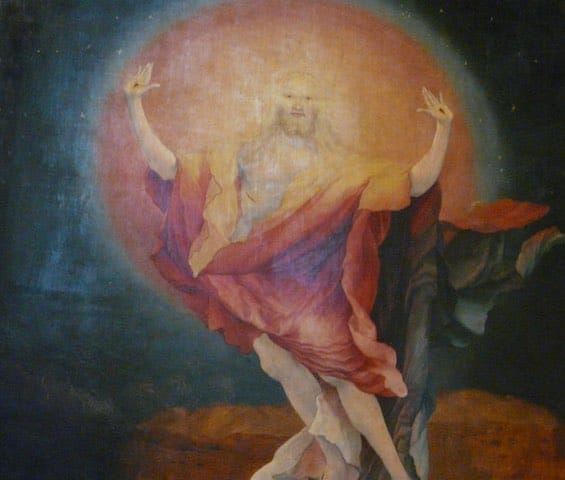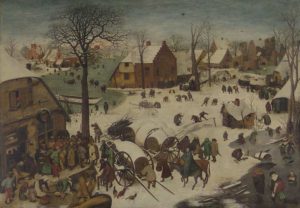Do not look for the Living among the dead – remember… !”
Christ’s death, a huge void
In the early morning of the first day of the week, some Jewish women walk silently in the streets of Jerusalem, a hand basket filled with bottles of scented oils and herbs.
No, they do not feel like conversing together, they hasten to pay the required tribute to a dead person.
And what a dead person! The one who was spoken of by the prophets as the mighty Savior who delivers from the enemies (Luke 1.69-71)
The one who comes in the name of the Lord, according to Psalm 118.35 (Luke 13.35)
The one who healed the sick and raised the dead …
The one whom some even openly or secretly hoped to see expelling the occupying Romans and sitting on the throne of the ancient kings of Israel.
Nothing of all that happened but a vast, overwhelming void. All hopes collapsed: Jesus died on a cross two days before, on Friday afternoon.
A huge void that nothing can fill, certainly not the custom, the obligation to finish the care due to the body barely begun two days before.
The women who had accompanied Jesus from Galilee followed, and they saw the tomb and how his body was laid in it.Then they returned and prepared aromatic spices and perfumes. On the Sabbath they rested according to the commandment. Now on the first day of the week, at early dawn, the women went to the tomb, taking the aromatic spices they had prepared.They found that the stone had been rolled away from the tomb, but when they went in, they did not find the body of the Lord Jesus. (Luke 23:55-24:3 NET)
The empty tomb
After the crucifixion, Jesus’ body was buried in a hollowed rock lent by Joseph of Arimathea, a sympathizer. The women were there too; they watched to see how to handle next. Usually, it is they who care for the funeral toilet.
A large round stone has been driven to close the entrance. (Matthew 19.60) This will certainly complicate things.
Now they arrive in the garden in front of the cave.
No more stone at the entrance, that settles it. But … oh, what a shock! : no more body either!
What the women find has no link with what they expected; the tomb is empty.
While they were perplexed about this, suddenly two men stood beside them in dazzling attire.The women were terribly frightened and bowed their faces to the ground, but the men said to them, “Why do you look for the living among the dead? He is not here, but has been raised! Remember how he told you, while he was still in Galilee, that the Son of Man must be delivered into the hands of sinful men, and be crucified, and on the third day rise again.” Then the women remembered his words, and when they returned from the tomb they told all these things to the eleven and to all the rest. Now it was Mary Magdalene, Joanna, Mary the mother of James, and the other women with them who told these things to the apostles.
Luke 24:4-10 NET
The proclamation of the angels
Instead of the dead person, strange characters, with glittering clothes, are there, two angels, as later the disciples of Emmaus will repeat (Luke 24.23)
These men in shiny clothes utter two contradictory statements:
Why do you seek the Living among the dead?
It was necessary that the Son of man be crucified and die.
And look now: he is risen = he lives!
Why do you seek the Living among the dead?
The Living instead of “he who is alive”.
The Living: the main character of God
God is the living God, quoted this way several times in the Old Testament, especially in Psalms 18, 42, 84.
He is the Lord God, the One who lives forever, YHVH, Adonai,
“I am who I am” (Exodus 3:14).
Jesus claimed that identity with God.
He claimed eternity: “Before Abraham was, I am” (John 8.58); “I am the resurrection and the life” (John 11.25).
Equality: “I and my father are one” (John 10.30);
authority over creation: the calming of the storm;
over demons: the healing of the demoniac;
over death: the resurrection of Jairus’ daughter, that of Lazarus.
The Living must die to resurrect
The Living: a fine title for the resurrected one (Revelation 1.18)
Yet this living must die to be reborn and bear fruit, like the grain of wheat falling to the ground (John 12.24)
He is no more here, but he is risen. Remember what he told you when he was yet in Galilee:
“The Son of man must be delivered into the hands of sinful men, be crucified, and on the third day be raised again. ”
He has risen, this is the explanation of the empty tomb.
Remember!
Remember: it is a call to memory, the memory of Jesus’ words, not a return to the grave!
Remember: let come back, let take place in your present, remember the meaning of the words spoken and of the actions carried out in the past of salvation history!
Remember the announcements that Jesus, in his lifetime, had made about his death and resurrection!
The Son of man must be delivered into the hands of sinful men, be crucified, and on the third day be raised again.
Remember the announcements of the passion of Jesus!
For Luke it is Jesus himself who has given in advance the sense of his resurrection. Repeatedly, he announced the necessity of his suffering and death. He claimed to be the suffering Son of Man.
“The Son of Man must suffer many things and be rejected by the elders, chief priests, and experts in the law, and be killed, and on the third day be raised.” Luke 9:22 NET
“Take these words to heart, for the Son of Man is going to be betrayed into the hands of men.” But they did not understand this statement; its meaning had been concealed from them, so that they could not grasp it. Yet they were afraid to ask him about this statement. Luke 9:44-45 NET
Then Jesus took the twelve aside and said to them, “Look, we are going up to Jerusalem, and everything that is written about the Son of Man by the prophets will be accomplished. For he will be handed over to the Gentiles; he will be mocked, mistreated, and spat on. They will flog him severely and kill him. Yet on the third day he will rise again.” But the twelve understood none of these things. This saying was hidden from them, and they did not grasp what Jesus meant. Luke 18:31-34 NET
Nobody understood the announcements of the passion
Explanations, justifications were necessary.
And “everything that was written will be fulfilled”.
But the disciples did not understand the meaning of Jesus’ words when he announced his passion or they did not dare to question him.
They did not understand and did not dare to ask any questions. Probably because, if challenged (“this does not happen to you”), they were afraid to get the same answer that the Lord gave to Peter “Get behind me, Satan!” (Matthew 16.22-23)
The fact is: they argued about the first place, just after the announcement of the passion (Luke 9.46)
No one really understood. Nobody remembered, women either. They should have remembered, but what?
The memory comes back
It takes an intervention of angels to understand, so that the memory comes back to memory.
Then they remembered his words.
Their memory comes back. The women remember: the empty tomb, Jesus’ predictions, all he announced about his suffering, his death and resurrection, the proclamation of the angels … Do not look for the Living among the dead!
Remember what he announced!
He had to die to resurrect
The women, in respect of funeral tradition, head to the grave, the messengers redirect them towards life.
They are baffled by the discovery of an empty tomb, but they receive the good news of Jesus’ resurrection.
The messengers of the resurrection
Now they are sure, these faithful dedicated women, who followed Jesus across the country (Luke 8. 1-3) can now announce to the apostles the good news of the resurrection. (Luke 24.9-10). And only when they have fulfilled their function as messengers, apostles of the apostles, Luke specifies their names.
Looking for the Living among the dead!
Do not look for the Living among the dead. Remember…!
Seeking the Living among the dead!
Is that not what we often do without realizing it.
We remember, we turn to the past, ours or others’, we call back memories and curiously we call rather the bad ones!
We look for explanations for what went wrong, and that kind of remembrance ruins life, one’s own and often that of others as a corpse in a tomb. And these ruminations, these attempts at justification will not change much, far from it.
We remain tense on the negative things, on the failure, on the conflict we cannot forget, forgive: the fact is that we speak about it at every opportunity.
It would be better to remember what the Lord said, linking our reality with his words in order to understand, to move forward.
Because the Living is there, sometimes like a light at the end of the tunnel, but he is there. In the moment we let go, he manifests himself and liberates us.
Remember, but not the tomb, remember the Living!
C.Streng



